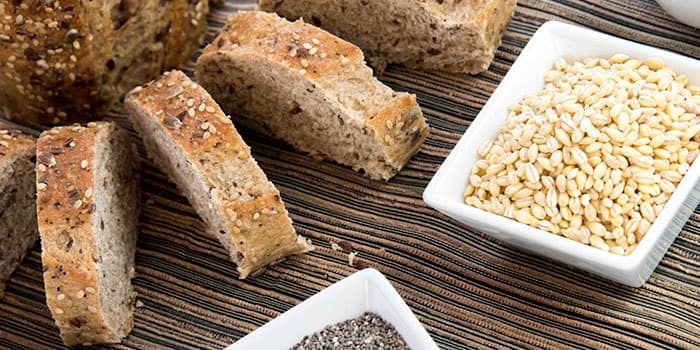How Carbs Can Help You Get the Most Out of Your Workout

Contrary to popular belief, carbs are not the enemy. In fact, if you’re looking to improve your athletic performance, they’re a potent ally.
Along with fat, carbs are fuel. Fat provides the long-burn source; carbs, the short burn. The body stores both, but can store glycogen (the resident energy of carbohydrates) in far less quantity. Low-to-moderate levels of exercise will utilize fat as fuel, but exercising at higher levels of intensity causes the body to shift its energy source from fat to glycogen. That’s one reason regularly including carbs in your diet is recognized as an essential part of athletic training.
“Carbohydrates are…the main fuel source to ingest for optimal recovery allowing for high volumes and intensity of training in subsequent bouts,” writes Dr. Jon Bartlett, Ph.D. College of Sport and Exercise Sciences at Victoria University in Melbourne.
Carbs basically come in three forms: starches, sugars, and fiber. But the discussion of carbs and exercise basically centers on the sugars (primarily glucose and fructose). Exercise taps these energy stores as the glycogen is pulled into the muscle and then stored or used as fuel. If you’ve ever gone on a long ride, a long run, or pushed through a long exercise class and suddenly lost your energy or felt like you hit a wall, you’ve experienced what it feels like to have depleted your available glycogen stores. After this, the body goes on a recon mission to try and find other sources it can use for energy – fat first, then eventually protein – but those stores are less effective under intense conditions.
“As training intensity and duration changes, so does the amount of carbohydrate to elicit the best performance. As exercise duration increases, the need for carbohydrate ingestion increases,” writes John Eric Smith, Ph.D., assistant professor at Mississippi State University and director of the Joseph A. Chromiak Laboratories of Applied Physiology. In his research, Van Loon found that simply eating carbs during exercise can help delay when you might hit that wall and a review by the American Dietetic Association, Dietitians of Canada, and the American College of Sports Medicine showed that consuming carbohydrates during exercise “has been shown unequivocally to extend endurance performance.”
How Many Carbs Do You Need?
The body cannot store glycogen in large quantities. Provided they’re getting adequate calories in their diet, most people should have enough for about 90 minutes of hard effort. The body can,however, replenish this store fairly quickly and easily. And, as you get more fit, you get more efficient at storing and utilizing glycogen.
“Regular exercise training makes a person capable of maintaining a certain exercise intensity level for a prolonged period of time before running out of glycogen reserves and having to stop,” wrote professor L.J.C. van Loon, Department of Human Movement Sciences, at the Maastricht University Medical Centre in the Netherlands. “In addition, exercise training also increases the capacity to store carbohydrates; trained athletes are able to store up to 50% more glycogen in their muscle (from 350 to up to 700 grams).”
“Manipulating diet and exercise training can optimize muscle glycogen reserves. This is important for any sport requiring prolonged moderate-to-high intensity bouts of exercise…[and] especially important for endurance type sports such as cycling, marathon running, or triathlons,” van Loon wrote in The Human Engine. “A well-balanced intake of nutrients is important for optimizing athletic performance,” said Smith. “During exercise, carbohydrate intake is important in providing a fuel that can quickly be converted to energy. Following exercise, carbohydrate is needed to replenish muscle glycogen stores and protein is needed to help build and repair muscle.”
How many carbs to consume during exercise differs from person to person but Smith recommends 30-60 grams per hour of exercise (up to two hours). Go beyond two hours, and you might need to up it 60-90 grams.
What About Before a Race or Competition?
For those in competition, the concept of “supercompensation” has been one method to increase carbohydrate levels. This is when athletes follow a week-long course prior to a race that combines training with carb depletion and carb-loading. Van Loon contends that supercompensation has fallen out of favor and been replaced by “modified supercompensation,” a method that calls for the tapering of exercise and an increase in carbohydrates in the days leading up to competition.
Some of Bartlett’s work has studied a similar concept, using a “train low, but compete high” approach in which athletes reduce carbohydrates during training and then increase them just prior to competition.
But it’s a balancing act. “There is no specific amount of [carbohydrate] needed for optimal training performance,” Bartlett said. “More likely, it is a case of feeding CHO according to your daily requirements.”
So, if you’re working out regularly, ignore the headlines suggesting you need to go low-carb to get thin and give your body the fuel it needs. You’ll feel better during your workouts and be more likely to see results if you do.

